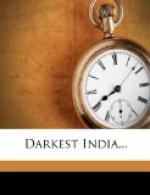Mrs. Howard M’Lean hopes the Scheme may have an immediate trial.
Mrs. Howard M’Lean “presents her compliments to General Booth, and begs to send him her promise of L100, in the earnest hope that the scheme set forth in ‘In Darkest England’ may at least have a fair trial, and that immediately.”
The “Times of India” points out the advantages of the Scheme.
If we apprehend the scheme aright, it will be carried out independently of existing charities, and indeed not under the guise of a charity at all. The bread of poverty is bitter enough, but that of pauperism is bitterer still, and General Booth, it would seem, intends to foster rather than discourage such spirit of independence as he may find among the lost souls for whom he works. But it seems to us that where such a scheme as his chiefly gains its power, is in its total dissociation from church or sect. However good the work which is done by the Church and by the more widely ramified agency of the Non-conformist sects—and no one will be found to deny that this work is of the greatest possible value in relieving the destitute and reclaiming the criminal classes—there is little or no unity about it. It is under no individual control, it is not carried out on any uniform system, and one agency has no means of knowing what another agency is doing. The result is that relief gets very unevenly distributed, and the lazy and dissolute profit at the expense of the deserving poor. Nor do any of these agencies, as a general rule, aim at any systematic crusade against other destitution than that of the moment. When they touch the lowest of low-life deeps; it is for the most part in the way of temporary relief only, without the effort (because they have not power) to set these people on their feet again and give them the means of earning a living. It is here that General Booth steps in, and by an elaborate but perfectly feasible system, proposes without any attempt at proselytization to drag the poor from their poverty, put them in the way of doing work of any kind they may be fitted for, and eventually establish them in an over-sea colony.
Looking now to the objections which may be urged against General Booth’s scheme, we are at once confronted by two important considerations. The first concerns the “General” himself. He asks for a million pounds sterling to enable him to carry out his project, and the question seems to have already been asked, Is he the person to whom a million pounds may be entrusted? Will it be so safeguarded that those who subscribe may feel assured that the money will be properly applied and an honest attempt made to do the work here planned out? To all these questions we are disposed to reply in the affirmative. General Booth and his Salvation Army have by this time pretty well weathered the storm of abuse and scorn with which their methods were at first received, and however much we may be disposed even now to question




